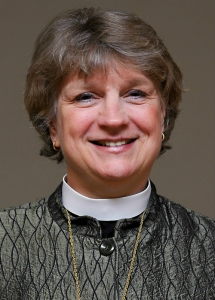 by Bishop Ann Svennungsen
by Bishop Ann Svennungsen
Occasionally, I am free to worship at the church where our son, John Amos, is interred. The columbarium is next to the baptismal font; as I dip my fingers in the water, I remember the promise, “if you have been buried with Christ in a death like his, you shall also be raised. …”
One of my daughters will usually join me, though they occasionally arrive late. (I look for them around the time of the prayer of the day.) I also know members of the congregation. Today, I see a widow whose husband was interred in the same columbarium just before our son, a man who struggles with a chronic and degenerative illness, a woman deep in vocational discernment.
Though we Lutherans do not recognize “community” as one of the sacraments, I believe it is clearly a “means of grace.” It is a means for God to create, sustain, and challenge faith. Indeed, we would affirm that the creation and sustenance of faith is impossible outside community.
LAST SUMMER, I WAS invited to join a Lilly-funded seminar of seminary presidents and church leaders exploring how we might better prepare pastors for the work of “building and leading communities.” This is a critical question in our culture of individualism, anonymity, and 24-hour entertainment options without even leaving your recliner. It takes study, practice, and courage to build what seems a counter-cultural endeavor.
“Though we Lutherans do not recognize ‘community’
as one of the sacraments, I believe it is clearly a ‘means of grace.'”
Still, the need for community is great. At the recent Stewardship Lab, Scott Vaughan noted, “in this country, people are starved to death for friends.” We are hungry for community. A recent UCC survey of 864 congregations found a strong correlation between congregational vitality and the ability of pastors to lead communities. Indeed, the leadership capacity to mutually equip and motivate a community of faith was related to the greatest number of congregational vitality factors.
Our synod supports pastors in leadership development through peer groups, training in community organizing, and work in adaptive change. There’s lots being done – more we can do. Let us know what you’ve found helpful in this challenging work of leading community. (Send any suggestions you would be willing to share to Pastor Craig Pederson at c.pederson@mpls-synod.org .)
We need community. We need pastors and lay leaders who can foster community. The witness and embrace of “saints below and saints above” is a vital means for us to experience God’s grace.
